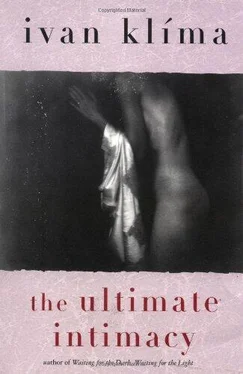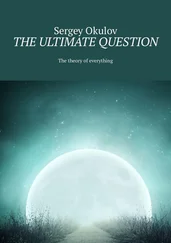Ivan Klima - The Ultimate Intimacy
Здесь есть возможность читать онлайн «Ivan Klima - The Ultimate Intimacy» весь текст электронной книги совершенно бесплатно (целиком полную версию без сокращений). В некоторых случаях можно слушать аудио, скачать через торрент в формате fb2 и присутствует краткое содержание. Год выпуска: 1998, Издательство: Grove Press, Жанр: Современная проза, на английском языке. Описание произведения, (предисловие) а так же отзывы посетителей доступны на портале библиотеки ЛибКат.
- Название:The Ultimate Intimacy
- Автор:
- Издательство:Grove Press
- Жанр:
- Год:1998
- ISBN:нет данных
- Рейтинг книги:3 / 5. Голосов: 1
-
Избранное:Добавить в избранное
- Отзывы:
-
Ваша оценка:
- 60
- 1
- 2
- 3
- 4
- 5
The Ultimate Intimacy: краткое содержание, описание и аннотация
Предлагаем к чтению аннотацию, описание, краткое содержание или предисловие (зависит от того, что написал сам автор книги «The Ultimate Intimacy»). Если вы не нашли необходимую информацию о книге — напишите в комментариях, мы постараемся отыскать её.
The Ultimate Intimacy — читать онлайн бесплатно полную книгу (весь текст) целиком
Ниже представлен текст книги, разбитый по страницам. Система сохранения места последней прочитанной страницы, позволяет с удобством читать онлайн бесплатно книгу «The Ultimate Intimacy», без необходимости каждый раз заново искать на чём Вы остановились. Поставьте закладку, и сможете в любой момент перейти на страницу, на которой закончили чтение.
Интервал:
Закладка:
Apparently he does not enjoy talking about his wife; maybe there's something not quite as it should be between them and that was why she did not even come to see him. Perhaps that was the reason for his illness; Hana recognized long ago that most illnesses have their origin in mental not physical pain.
And what does her husband do, the journalist wants to know.
Her husband is a pastor.
'I've never taken coffee with a pastors wife. Nor with a pastor, for that matter. My people were unbelievers and I take after them. I must have been in more pagodas than churches. But I only visited them because I was interested in statues of the Buddha.'
'Do you think it's possible to live without a faith? Live well, I mean.'
'The way I see it, Matron, what is more important than faith is to have a good heart. I met a lot of people like that in China. They had no faith, just a good heart. And you're exactly that sort of person, and that's why you are able to take loving care of total strangers.'
'We are all carers.' Hana is at a loss; she is not used to chatting with men.
'Of course. But you're different. I'm sure you're kind to good and
bad alike. Because you can't help being kind. You remind me a bit of my mother. When she was still very young,' he quickly adds. 'She was the best person in the world.'
'That's what everyone thinks about their mother.'
'But she really was an exceptional woman. And I have known both exceptional and selfless women.' Again he recalls some Chinese women he once met when he first arrived in that country. Their husbands had been jailed or had been sent for re-education to some commune a thousand kilometres away and everything had fallen on those women: caring for their families and earning a living so that their children did not die of hunger. And in China, particularly for women, that meant working until they dropped. But they did not complain and bore their fate with humility and courage.
'Maybe they were ashamed of complaining in front of you, a foreigner.'
'Maybe,' he concedes. 'But all the same, their patience and composure was remarkable. And they waited loyally for their husbands.'
He then goes on to tell her about a massive flood he once witnessed on the Yellow River. The water got into the houses and barns, carrying away livestock, chattels and even people. The women behaved just like the men. They would carry a hundredweight of earth in baskets on their backs, those little women, to help repair the dikes and save what could be saved. It was impossible to save anything anyway, as water is such a mighty element and in that plain there wasn't even the tiniest mound you could climb up above the water.
Hana listens to him with interest. She likes the way he speaks nicely about women, even if they were women from a country she will never set eyes on.
And weren't you afraid?' she asks him and says that she is afraid of water; water has always played a baneful role in her life, and almost killed her once.
Matouš starts to apologize for bringing water into his narrative but China is all water: rivers, enormous rivers flowing across the plains and between weird-shaped cliffs. And canals and rice paddies. In their paintings and songs, the surface of the water glistens in the moonlight. The trigram 'k'an' denotes water, rain and also danger. As to whether he was afraid, at such a moment one thinks of what one ought to do, not about the danger. The same thing applies to an earthquake. But during an earthquake everything happens so fast that one doesn't even
have time to be afraid. One either lives or not. Perhaps if he were trapped somewhere under rubble he might be afraid. He goes on to tell Hana about a volcanic eruption he witnessed during his one and only visit to Washington State. The volcano had a beautiful name — Helena — but what he saw was terrifying. It looked just like an atomic explosion. The entire mountain top blew off. He just stared at it and in those first seconds it didn't even occur to him that his life was at risk. It looked like a fantastic film effect. It finally came home to him when the cloud of ash and smoke started to drift towards him. All of a sudden he realized he couldn't breathe. And it started to turn dark in the middle of the day.
While Matouš is telling stories, he draws in the air with his finger: the plain, the water, the river winding through the rocks, and the mountain top flying off. Hana notices he has a pretty hand with fine, almost feminine fingers.
'But do you know what I found most astonishing of all was not the darkness at noon, nor the solidifying lava, nor the burning trees, but the silence. Not the cheep of a bird, not the chirp of a cricket — not even the buzz of a fly. Most of the people around me found it horrifying but for me it brought back the words of the Chinese sage: In the sky symbols arise, on the earth shapes are formed. And also: What first rises to the sky must fall to earth. And instead of being horrified, I was aware of the greatness of nature.' Matouš relates terrible experiences yet smiles all the while at Hana. When Hana expresses surprise at his smile, he explains that when he experiences something of that kind he is actually happy: that he survived and that he has enriched his life, his experience. And that was something he always longed for, particularly while he was young — to experience something, to understand something and then tell people about it.
'Tell them what?' Daniel was possessed by that need too. It is a male characteristic. Daniel retells an ancient message, trying to inflame even the hearts of those who seemed bent on taking the opposite view. Because of it they had lived in poverty and had to live for a time in a remote village. And they had not been allowed to travel at all.
'That's not easy to answer in a few words. At one time I had an urge to tell people at least something about the world they were not allowed to see: what it looked like, how the people behaved, the way they thought, what customs they had. You see, the world was divided into two in those days. Our part was good, the other part was bad: now its
the other way round, in a sense. Nevertheless there is only one world and it is both good and bad. Most important of all, it is threatened by what we do in it. We rush forward somewhere without looking to right or left. That's something you become aware of in that place, where, since time immemorial, they have acknowledged values other than just progress and the pursuit of success and change. When you return you are bound to ask: where will it all end? And your answer is: in the end we will destroy ourselves and life in general.'
'People always expect catastrophe,' Hana says. 'At one time people actually expected the end of the world. My husband often talks about it in sermons: how the sun will turn black, the moon will run blood, the stars start to fall to earth and the skies disappear. It's a horrifying thought.'
'That's true,' the journalist admits, and he excitedly starts to tell her how these used to be only nightmares. The beast rising out of the sea had seven heads and ten horns. The Hindus believe that when the age of Kali arrives, the gods will massacre each other, the earth will be engulfed by fire and water, and there will be a return to the chaos that reigned before Creation. The Persians believed that life would perish in the convulsions of the earth, after which would come fire, flood and the fall of the heavens. It was always something that would come irrevocably by a higher will. Nowadays we are preparing our destruction ourselves because we are too attached to material things. Man should fix his mind on other values. He should seek the love that sees and is wise, as well as harmony and the fundamentals of the order that rules the universe.
'My husband says everything happens by the will of God. Without it, not a hair will grow, or fall from the head. But he also appeals for love.' It is odd how easy she finds it to talk to this man. She would never dare broach such subjects in front of Daniel. Daniel was too learned, serious, genuine and responsible. She would be afraid of blurting out in front of him something that would betray her ignorance. She finishes her coffee. 'Thank you for inviting me,' she says, 'and for the coffee.'
Читать дальшеИнтервал:
Закладка:
Похожие книги на «The Ultimate Intimacy»
Представляем Вашему вниманию похожие книги на «The Ultimate Intimacy» списком для выбора. Мы отобрали схожую по названию и смыслу литературу в надежде предоставить читателям больше вариантов отыскать новые, интересные, ещё непрочитанные произведения.
Обсуждение, отзывы о книге «The Ultimate Intimacy» и просто собственные мнения читателей. Оставьте ваши комментарии, напишите, что Вы думаете о произведении, его смысле или главных героях. Укажите что конкретно понравилось, а что нет, и почему Вы так считаете.






![Theresa Cheung - The Dream Dictionary from A to Z [Revised edition] - The Ultimate A–Z to Interpret the Secrets of Your Dreams](/books/692092/theresa-cheung-the-dream-dictionary-from-a-to-z-r-thumb.webp)





